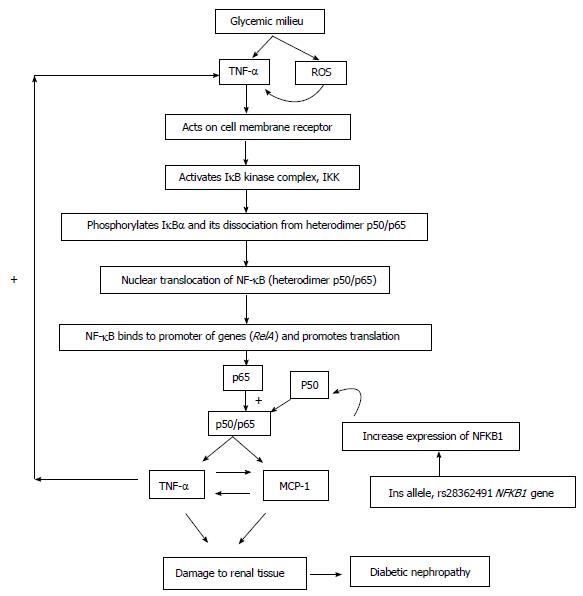Copyright
©The Author(s) 2017.
World J Diabetes. Feb 15, 2017; 8(2): 66-73
Published online Feb 15, 2017. doi: 10.4239/wjd.v8.i2.66
Published online Feb 15, 2017. doi: 10.4239/wjd.v8.i2.66
Figure 1 NFKB1 gene and inflammatory markers: Probable mechanisms in the pathogenesis of diabetic nephropathy.
Hypoglycemia induced ROS and TNF-α leads to activation of IKK. IKK causes phosphorylation of IκBα bound to p50/p65. Phosphorylated IκBα dissociate from p50/p65 leading to nuclear translocation of unbound heterodimer p50/p65 (NF-κB). Binding of NF-κB to promoter gene causes translation of p65. Ins allele, rs28362491 NFKB1 gene, if present, causes increase expression of p50. Hence there is increased production of p50/p65 heterodimer complex. This heterodimer acts on its downstream proinflammatory targets viz: MCP-1 and TNF-α leading to its synthesis. MCP-1 is a positive regulator of TNF-α and vice versa. Both MCP-1 and TNF-α causes renal damage leading to development of Diabetic nephropathy. ROS: Reactive oxygen species; TNF-α: Tumor necrosis factor-alpha; IKK: IκB kinase complex; MCP-1: Monocyte chemoattractant protein-1.
- Citation: Gautam A, Gupta S, Mehndiratta M, Sharma M, Singh K, Kalra OP, Agarwal S, Gambhir JK. Association of NFKB1 gene polymorphism (rs28362491) with levels of inflammatory biomarkers and susceptibility to diabetic nephropathy in Asian Indians. World J Diabetes 2017; 8(2): 66-73
- URL: https://www.wjgnet.com/1948-9358/full/v8/i2/66.htm
- DOI: https://dx.doi.org/10.4239/wjd.v8.i2.66









